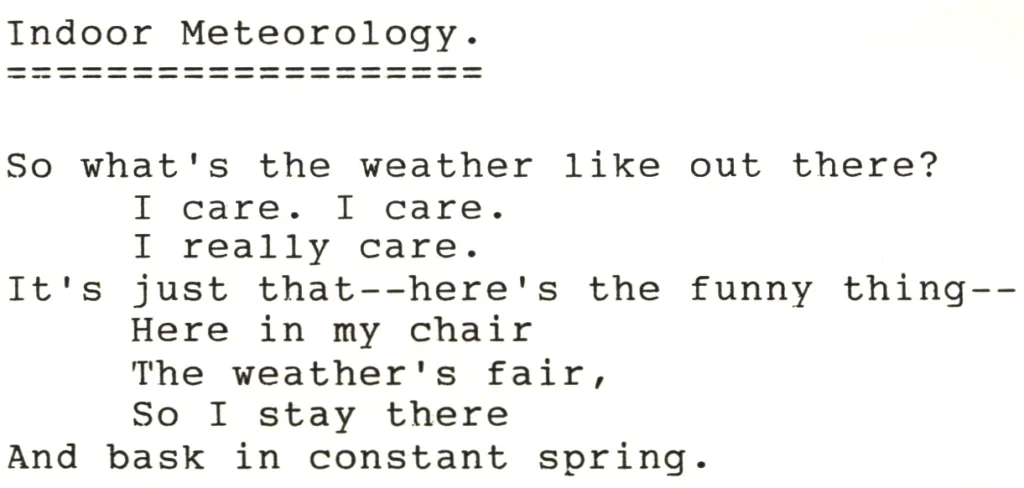The earliest burials at the site are believed to be located in the conical mound and date back to about 250 BC. Many of the people buried in this mound had copper tools and ornaments buried with them.… People that were buried later did not have this type of artifacts buried with them and some burials do not contain artifacts. This tells us that over the 2,000 years that ancient people used the site, burial practices and ceremonies changed.
LETTER TO THE EDITOR.
Sir: In reference to yesterday’s correspondence from Dr. V. L. van Wafel (“Schools Are for Learning, Not Sports,” Letters, p. A-14), I am very much afraid that Dr. van Wafel has completely misunderstood the problem. I would like it to be understood that I wholeheartedly endorse his premise: viz., that the purpose of school is learning. However, when he goes on to give examples of the kind of learning he endorses, he fails to understand the entire basis of the modern world we live in. My son Ervin attends Blandville High School, so I am familiar with the course of instruction there, and I have been reliably informed that it does not differ in substance from the curricula in other schools in our metropolitan area, except of course the Friends school, because Quakers are nuts.
Consider, for example, the math classes Dr. van Wafel insists are so essential. What do they teach that will be needed in the real world, the world into which Ervin will be unceremoniously thrust after his education is completed? Absolutely nothing! Every day, my son Ervin walks out the door with a phone in his pocket, and that phone has a calculator app that knows all the math he will ever need. And don’t tell me he needs to know algebra or trigonometry. Algebra is just a series of puzzles where you have to guess the secret number hiding behind a letter, and that’s fine if you like that sort of thing, but you don’t find prices expressed as “2x * y” at the Aldi. And nobody even knows what trigonometry is, let alone what it does.
But what about English? Well, here’s a little secret: Ervin already speaks English, and he learned to do it before he ever got to Blandville High. So all they ever have him do in English class is read stories and write essays about them. Fine, but he can read stories on his own time if he wants to do that. And if there must be essays about Nathaniel Hawthorne, we can have AI do them. That’s why we have artificial intelligence: so nobody has to waste time writing essays about Nathaniel Hawthorne.
I could go on about all the other classes, but they’re all useless. Spanish? We have Google Translate! Science? Everyone knows science is a left-wing conspiracy. And as for sex education, he’ll get much more up-to-date information if he just hires a prostitute.
No, the only teachers who teach anything actually useful are the coaches at Blandville High. Ervin is on the football team, so I can see the valuable life skills he brings home every day—how to use physical violence to get what you want, how to hit people where it hurts the most, and above all how to cheat and get away with it. That is the only skill that truly brings success in the real world. If you learn trigonometry, I suppose you can be a high-school math teacher. If you learn to write nice little essays about Nathaniel Hawthorne, I suppose you can stand at the entrance to the Liberty Tubes with a cardboard sign. But learn to cheat and get away with it, and you can be anything you want. Other parents tell me that the coaches in the other sports teach that same lesson, and Blandville’s enviable record in everything but lacrosse shows that they teach it well. I don’t know what’s wrong with that lacrosse coach.
So I would urge Dr. van Wafel to reconsider, not his principles, which are sound, but the application of those principles. Schools are indeed for education. They are places where our rising generation can learn the kind of ruthless dishonesty that will be necessary in any career path they take later in life. But the place where that education really takes place is the athletic field, not the classroom. The only real education our children get happens in school sports. —Sincerely, Abel Funkengast IV, President, Dubious Investments LLC.
FROM THE ILLUSTRATED EDITION.
INTERNATIONAL STEEL PEN APPRECIATION MONTH.
THE END.
THE IMPORTANT DECISION.
A SCURRILOUS POEM CIRCULATED BY THE ENEMIES OF THE PERSIAN KING.
AND GOD CREATED…
AN EPITAPH.

The typewriter is a Smith-Corona Electra 120, from a bygone era when it seemed like good marketing to name typewriters after characters in Sophocles.














